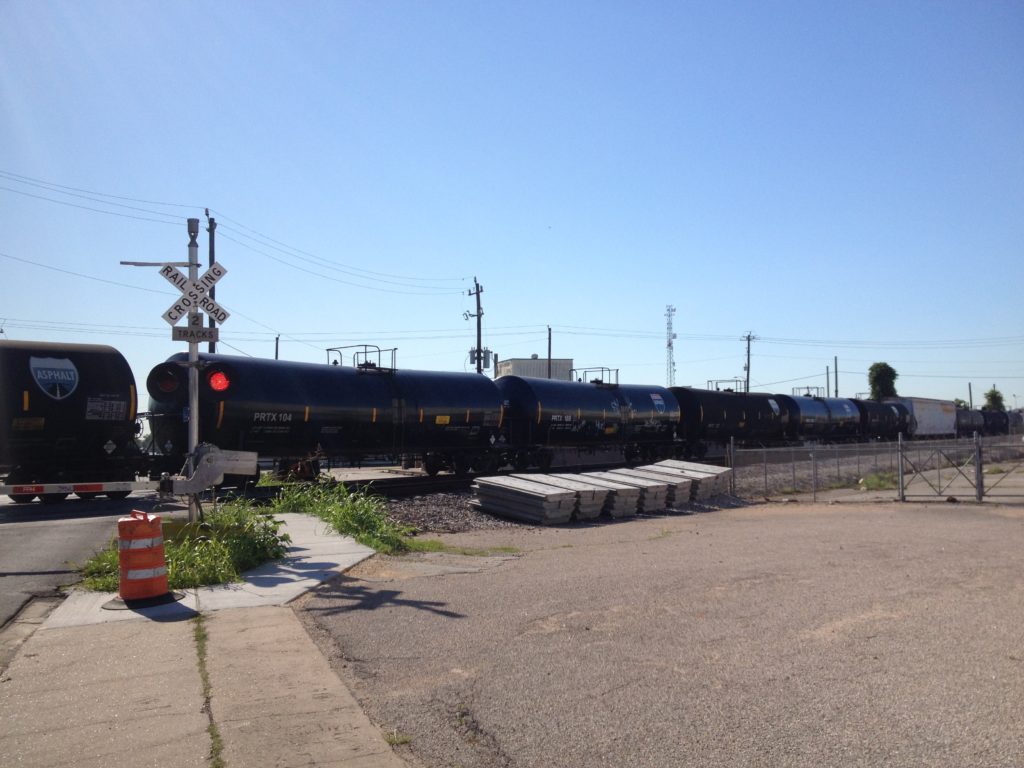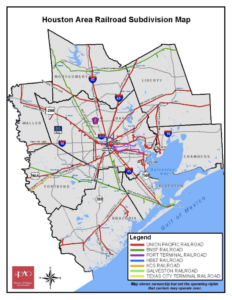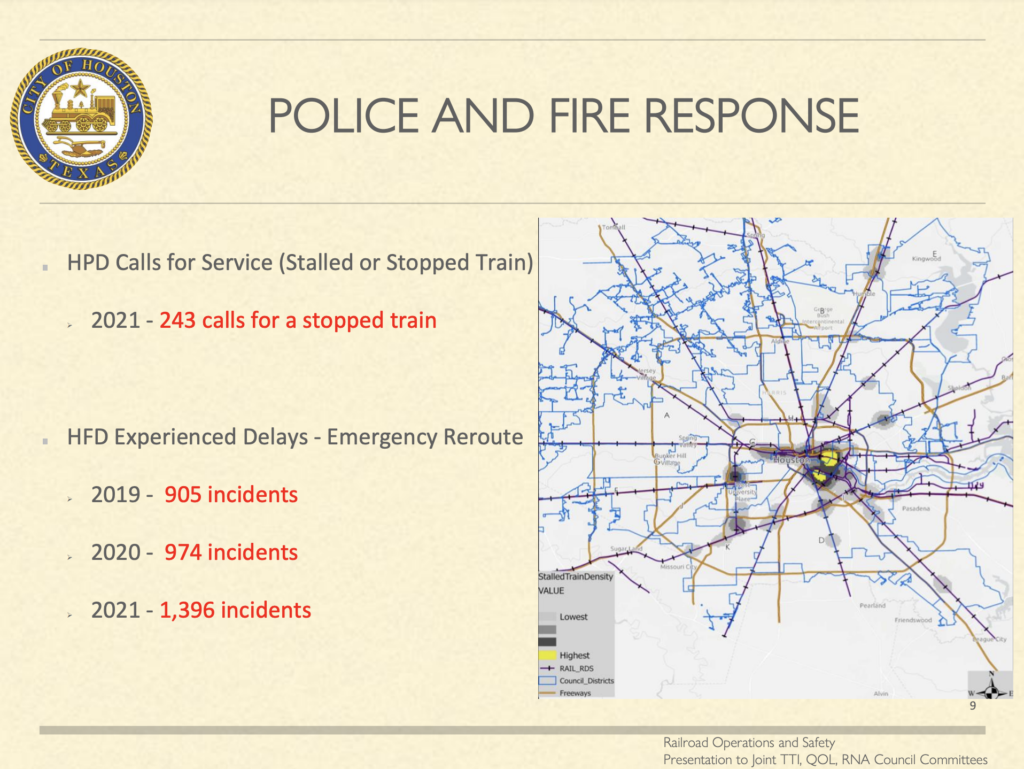Trains Block Communities and Create Safety Hazards
Houston residents tell City Council how train traffic impacts their lives every day.
By Stephanie Thomas
Houston’s East End is known for historic neighborhoods, some which predate Houston’s founding, cozy cafes and hip new restaurants serving up some of the most delicious food in town, and a cultural richness deeply embedded into the fabric of the community.
There’s something else the East End is well known for: trains.
To live in the East End is to be slowed down by trains. Whether you are driving to work, walking to school, or biking around town, if you live, work, or play in the East End, you’ve been stopped by a train.
But being stuck behind a stalled train is not just an inconvenience. It’s a safety and quality of life issue, too.

Houston City Council Takes on the Train Issue
On January 24th, the Transportation, Tech, & Infrastructure / Quality of Life / Regulatory and Neighborhood Affairs Committee joined together for a joint meeting to discuss how trains are hurting Houstonians every day. This committee meeting happened at the urging of City Council Member Robert Gallegos, who represents District I which covers the majority of Houston’s East End.
Houston’s rail system is complex. The railroad operators in Houston are Union Pacific, BNSF, Kansas City Southern, and the Port Terminal Railroad Association.
 Other entities involved with the rail include:
Other entities involved with the rail include:
- the Gulf Coast Rail District, whose mission is to improve safety and security at roadway/railway crossing and to promote multimodal mobility like commuter rail, bus rapid transit, and advanced technologies to improve passenger transport in our region, and
- the Federal Railroad Administration, a subdivision of the United States Department of Transportation, whose mission is to enable the safe, reliable, and efficient movement of people and goods for a strong America, now and in the future.
Katherine Parker, the executive director of the Gulf Coast Rail District, joined the meeting to provide an overview of the organization. The City Council had also invited the Federal Railroad Administration to join, but its leadership declined to be present. Furthermore, Union Pacific was the only railroad present at the committee meeting. UP has an outsized presence in the East End.
According to the Gulf Coast Rail District, 2,200 trains come through Houston every week. Train tracks cross many Houston neighborhoods, and blocked trains impact people across the City. However, the East End and Fifth Ward are particularly harmed.
Blocked Trains Hurts People in Need
The City is tracking complaints from residents, as well as reports from the Fire Department when their teams need to reroute to blocked intersections and slow-moving trains.
Fire Chief Sam Peña shared some troubling information with the committee. East Houston and Fifth Ward are most heavily harmed by delays in emergency response because of these communities’ proximity to railyards and the number of tracks. In 2019 and 2020, the Houston Fire Department experienced over 900 delays each year due to trains. In 2021, the Fire Department experienced nearly 1400 delays.
This means people in need are not getting the care they need when they need it. Delays in emergent care can cause harm.

Manchester, a Houston neighborhood, has dealt with trains blocking important intersections. In fact, the Bernie Guerra Bridge was constructed two years after Mr. Guerra, the president of the Manchester Civic Club, passed away. He had worked hard to advocate for his community, and lost his life when emergency responders could not reach him due to a blocked train.
Blocked trains put Houstonians’ lives at risk when they are unable to be reached in emergencies.
Blocked Trains Hurts Kids
Community members spoke about how blocked trains are a safety issue for their children. Many people reported seeing children crossing through blocked trains in order to make it to school.
Judith Cruz, a Houston Independent School District trustee, shared her concerns. Blocked train crossings affect students’ ability to arrive to school on time, meaning they miss valuable instruction time and fall behind. Many students arrive late every day because of perpetually parked trains.
Amy Kabile, the principal at KIPP Academy (located at Lockwood near Telephone Rd), said that every day this January, there has been a blocked train during student arrival time. The nearest fire stations and ambulances are on the other side of the tracks. She feels nervous if an emergency were to happen.
According to Council Member Tarsha Jackson, railroads are supposed to ensure that they aren’t parking trains near schools. The City doesn’t have any data yet to see whether railroads are following through.
Trains Block City Services
Trash trucks are delayed by trains. Oates Road is especially impacted by trains blocking access to the Republic Waste site. Central Street is also impacted due to Union Pacific and the Port Terminal Railroad Association lines.
Trains are a Barrier to the Local Economy
Blocked trains are hurting small businesses that lose foot traffic when customers cannot get across the tracks. Furthermore, employees can’t get to work on time because they get blocked behind trains, according to one small business owner.
Trains Aren’t Great for the Environment
According to Juan Parras with Texas Environmental Justice Advocacy Services, trains are an environmental justice issue that must be addressed.
Idling trains can emit diesel pollution. Diesel pollution harms people’s health, especially vulnerable people like children, the elderly, and people with pre-existing health conditions. Residents are also worried about off gassing from railcars and leaking chemicals.
A friend of mine used to live right across the street from a train track near Washington Avenue. As we sat on his front porch catching up, a train rolled by. This wasn’t unusual; trains came and went along this track all the time. What made this worrisome was that as we spoke, a waft of chemicals hit us. We had to go inside and shield ourselves from whatever was coming from that train.
People who live in close proximity to railyards have mentioned that they have seen chemicals leaking from the railcars. Years ago, I documented the chemicals being carried by train in the neighborhood where I worked. A lot of dangerous chemicals move through Houston and are classified as toxic, noxious, flammable, and/or explosive.
Listen to Leticia Gutierrez Ablaza from @airallianceHOU speak at today’s #HoustonCityCouncil Special Joint Meeting about community concern with railway cars leaking chemicals and disruptions to students commute to school. pic.twitter.com/qRNgJeQAKw
— The Healthy Port Communities Coalition (HPCC) (@HealthyPortHTX) January 28, 2022
It’s important to remember that as more trains come through our area, the more they will contribute to air pollution. Port Houston is about to undergo a massive expansive project, and we are expecting more trains to come through our neighborhoods.
The merger between Canadian Pacific Rail and Kansas City Southern might also increase rail traffic locally. In fact, the Surface Transportation Board determined that this merger requires an Environmental Impact Statement because of the potential for environmental harms and impacts to communities and wildlife. In Texas, this merger could create an increase in rail traffic by 8 rail cars per day.
“Traffic on the KCS international corridor — from Beaumont to Laredo, Texas, via a combination of trackage rights on Union Pacific and KCS’s own rails — is expected to double,” reported Bill Stephens in Trains.com coverage of the merger.
A draft Environmental Impact Statement will be completed in Spring 2022 and will provide an opportunity for stakeholders, which includes government, advocates, and residents, to comment.
Community Voice is Necessary
Leticia Ablaza with Air Alliance Houston asked for community representation on the Gulf Coast Rail District. When the Healthy Port Communities Coalition first spoke out regarding the harmful impacts trains were having on community members, we were met with skepticism. This issue may seem absurd to people who never step foot in East End or Fifth Ward and don’t understand that blocked trains create serious problems for those impacted.
Community representation ensures that the people most impacted have a say in decisions that affect them and their communities.
Where Do We Go From Here?
In order to improve the flow of trains in our community, Jack Hanagriff with the Mayor’s Office of Public Safety and Homeland Security says the easiest thing to do is to get the railroads back at the table to discuss this issue. Yet that might be easier said than done.
Given how much this issue is impacting Houstonians, the City has tried to bring stakeholders together to discuss this issue and find solutions to blocked trains. The railroads, however, have not been willing to come to the table. At the committee meeting, Union Pacific stated that they are willing to participate.
What can you do?
Report blocked trains. The Federal Railroad Administration created a website to track blocked crossings. FRA can’t do much, but reporting helps bolster up the data that says that blocked crossings are an issue in our community. Report blocked trains to the Federal Railroad Administration here.
You can also report blocked trains by calling Union Pacific at 888-877-7267.
Each public rail crossing has a unique Dept of Transportation identification number. This is like the address for the crossing that can help identify the location of the rail crossing. This can be helpful in your reporting.
Make this an issue for the Gulf Coast Rail District. The Gulf Coast Rail District meets every month. These meetings are open to the public, and community is provided an opportunity to speak. The next Gulf Coast Rail District meeting will be on February 9th at 2 pm. This meeting will be held in person at the Transtar office and will offer a way to connect virtually.
Stay tuned for updates from the Healthy Port Communities Coalition. Subscribe to our newsletter and follow us on Facebook and Twitter to catch the latest from us. We will keep you informed on opportunities to stop toxic trains from harming our communities.